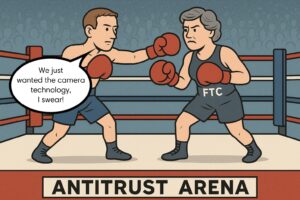In this week’s GME3 we’re looking at new betting limits on virtual slots in the UK, a new development in the OpenAI/New York Times lawsuit, and the Supreme Court’s deliberation over two new social media laws out of Florida and Texas. Find the full stories below!
Gambling
UK Slots Spin Down For Youth
The UK government has announced some interesting new responsible gambling measures, limiting the amount that people can wager on online slot games. As of September this year, players under the age of 25 will be limited to £2 per spin, while 25-and-overs have been trusted to bet up to £5 per spin. This comes after a similar limit was placed on physical slot machines – previously at £100, the limit was lowered to £2 in 2019.
The UK’s Department for Digital, Culture, Media & Sport (DCMS) has called the new measures a “landmark moment” for responsible gaming. Online slot machines are seen as one of the most addictive forms of gambling and have been associated with problematic behaviour like long sessions and binge play, and can result in large losses. Data gathered by the NHS has shown an 8.7% problem gambling rate for online slots, casino or bingo games. Furthermore, data gathered by the Office for Health Improvement and Disparities has shown that young adults are especially vulnerable when it comes to gambling-related issues, especially those under the age of 25. This is likely due to having less disposable income, inexperience managing money, and ongoing neurological development, argue the experts.
Zoe Osmond, the CEO of gambling charity GambleAware publicly voiced her approval for these new measures, calling the new stake limits an “important mechanism to protect young people.” However, some are concerned that the new measures don’t go far enough. Gambling with Lives co-founder Charles Ritchie called the £5 for over-25’s a “missed opportunity” and has also called for further measures, like slower spin speeds, affordability checks, and more public health information.
These new rules will come into effect in September, with a six-week transition period to allow operators to enact the general £5 stake limit rules, followed by another six weeks to create any necessary technical solutions to ensure compliance with the £2 limit for younger adults. Maybe Ontario (being a younger market) will end up following in the UK’s footsteps. But, until these new rules are enacted in September, there is no limit set on how much can be wagered on a single online spin.
Media
Robot Reads The Times
OpenAI, developers of popular generative AI software like ChatGPT and DALL-E, have requested for a federal judge to dismiss parts of the ongoing copyright case launched against them by the New York Times. OpenAI alleges that the newspaper “hacked” ChatGPT in order to generate misleading evidence to improve their case.
The New York Times is accusing OpenAI of infringing copyright by training its large language models with content from their newspaper. The complaint cites examples where OpenAI and Microsoft chatbots gave users near-verbatim excerpts of New York Times articles when prompted.
This Monday, a representative from OpenAI had this to say about the suit:
“The allegations in The Times’s complaint do not meet its famously rigorous journalistic standards. The truth, which will come out in the course of this case, is that The Times paid someone to hack OpenAI’s products.”
OpenAI argues that it takes very specific prompts and many attempts to get ChatGPT to generate a whole, unedited article from The Times, and the average user would never get that result otherwise. However, OpenAI has not named the “someone” that they are accusing the Times of hiring, and has also not accused the paper of breaking any hacking laws.
On Tuesday, The Times attorney, Ian Crosby stated that “What OpenAI bizarrely mischaracterizes as ‘hacking’ is simply using OpenAI’s products to look for evidence that they stole and reproduced The Times’s copyrighted work.” Crosby’s response makes sense: can you call it “hacking” if you’re interacting with the front end of the software like any other user?
The key fact that this case hinges on, whether the use of copyrighted material for AI training falls under fair use laws, has yet to be decided by the courts. Until that decision comes down, it seems likely that this legal battle will continue.
Entertainment
First Amendment, Last Chance
On Monday the US Supreme Court heard over four combined hours of arguments over two state laws that would regulate how large social media companies control the content that gets posted to their websites. These laws, out of Florida and Texas, would force these companies to represent the viewpoints of all users, while also preventing them from de-platforming politicians. These laws were introduced by Republican legislators to combat the perceived efforts to diminish conservative voices on platforms like Facebook, Instagram, and X.
The majority of justices seem to believe that these laws would violate the First Amendment rights of these social media platforms but also appeared reluctant to block the laws in their entirety.
NetChoice and the Computer and Communications Information Association are two huge tech lobbying groups that argue these laws would violate social media platforms’ First Amendment rights to make editorial decisions about which content to allow or ban. These laws would also make it near impossible for platforms to moderate hate speech or other types of content that could be seen as harmful (especially to young users).
The argument essentially comes down to whether or not these social media platforms are themselves subject to the First Amendment. Chief Justice John Roberts, rather bluntly, stated that “The First Amendment doesn’t apply to them. The First Amendment restricts what the government can do.” In other words, the First Amendment was designed to protect freedom of speech from government interference, not other private citizens or corporate entities.
It’s unclear where this will go from here, with some judges suggesting that the case be referred back to the lower courts, where they can go through the myriad provisions one by one and determine which are appropriate. Either way, be sure to follow GME Law on LinkedIn for any future updates!
GME Law is Jack Tadman, Zack Pearlstein, Lindsay Anderson, Daniel Trujillo, and Will Sarwer-Foner Androsoff. Jack’s practice has focused exclusively on gaming law since he was an articling student in 2010, acting for the usual players in the gaming and quasi-gaming space. Zack joined Jack in September 2022. In addition to collaborating with Jack, and with a keen interest in privacy law, Zack brings a practice focused on issues unique to social media, influencer marketing, and video gaming. Lindsay is the most recent addition to the team, bringing her experience as a negotiator and contracts attorney, specializing in commercial technology, SaaS services, and data privacy.
At our firm, we are enthusiastic about aiding players in the gaming space, including sports leagues, media companies, advertisers, and more. Our specialized knowledge in these industries allows us to provide tailored solutions to our clients’ unique legal needs. Reach out to us HERE or contact Jack directly at jack@gmelawyers.com if you want to learn more!
Check out some of our previous editions of the GME3 HERE and HERE, and be sure to follow us on LinkedIn to be notified of new posts, keep up to date with industry news, and more!




